I had so many amazing experiences in Peru because of the financial help I got from the SHIP grant. We were able to go on many weekend excursions that not only helped show us beautiful natural wonders, but furthered our education of Peruvian and Incan culture. On the weekends we went on a city tour of Cusco, the Maras salt mines, Rainbow Mountain, Machu Picchu, Lake Humantay and Lake Titicaca. All of these weekend excursions happened over 1 or 2 days with tour guides that would explain the history and significance of these sites. My favorite experience from Peru was my visit to Machu Picchu. Cusco is the jumping off point for Machu Picchu and many other sites so it was very convenient to travel there. We were able to talk the new train line and stay overnight in the small town of Augas Caliente. The name originates from the hot springs that are in the town. The town was created essentially for tourists to have place to stay before early morning hikes so the environment of the town wasn’t very Peruvian. But the actual site of Machu Picchu was absolutely magnificent. Machu Picchu was a small civilization for the Incan people but is also a very important cultural, astronomical and architectural site. It is carved directly into one of the eastern sides of the Andes Mountain range. We had a 3 hour tour which began with a history of the Incan people and how Machu Picchu came to be. Machu Picchu was built in the 15th century and is a UNESCO World Heritage site. There are about 200 structures in Machu Picchu and our guide explained the purpose of each as well as the difference between the rich and working class housing. We then had free time to explore all the structures and learn more ourselves. It was the most amazing place. I have truly never seen anything like Machu Picchu before and it was an experience I will keep with me for the rest of my life.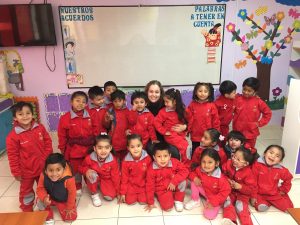
Monthly Archives: September 2019
Eliane Heller Works with Preschool, and with People Living with Disabilities in Cusco, Peru (Summer 2019) Blog 1
My SHIP funded experience was my Summer of Service for the Bonner Program. Through both Bonner and SHIP funding, I was able to spend 7 weeks this past summer in Cusco, Peru. The area of impact for the SHIP grant was participation in a volunteer or service experience. My roommate and I researched various non-profits who had programs in South America. We were both very interested in being in a South American country in order to not only experience something new, but to help us with our Spanish language skills. We eventually found A Broader View Corps, a small non profit based in Pennsylvania that focused on community service and engagement in areas that need volunteers. Throughout the 7 weeks we volunteered for 280 hours per the Bonner Program’s requirements. We volunteered at two sites. The first was a local kindergarten where I was in a 4 year old classroom with 25 children. The second was an orphanage for children with disabilities. In the kindergarten class I was essentially a teaching assistant and would help the teacher with preparing daily activities and extracurriculars. I even was able to lead my own class periods and teach various ideas in English. I was able to teach the students the colors, insects and other animals in English. Our other volunteer site was an orphanage for people with disabilities that had both an adult section and a children’s section. I worked in the children’s ward. Most of the children have severe disabilities, being both in full body wheelchairs and mostly nonverbal. I would walk them around in their wheelchairs to get fresh air, help with laundry, and help feed the children during lunch and dinner time. Both of these experiences were very formative and it was so nice to be able to immersive myself into not only two separate non profits but in the Peruvian culture.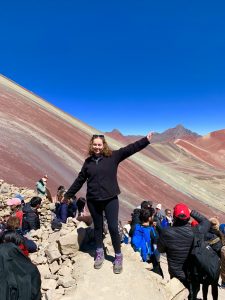
Madison Fritz Works with Preschool, and with People Living with Disabilities in Cusco, Peru (Summer 2019) Blog 2
While volunteering in Cusco, I was fortunate to be able to take full advantage of the incredible abundance of history and natural beauty located within the city and its many surrounding towns. Although the majority of our seven weeks were spent volunteering at our two community partners, a preschool and a home for people with disabilities, my roommate and I were able to spend the weekends exploring the city as well as take part in several cultural excursions. We were lucky to visit many incredible, unique places such as Machu Picchu and Lake Titicaca – two places that I have studied about multiple times during my time at Rollins and was awestruck to be able to visit them in person. Although it was undeniably incredible to visit these places, my favorite weekend excursion was not to the major tourist spots in Peru, but instead was a weekend spent with my host family in their country home in Ollantaytambo.
In Cusco, we lived with the loveliest family – a mom and a dad, four children (the majority of whom were under the age of twelve), and their adorable family dog, Ottie. They immediately welcomed us into their home and made us feel like a part of their family rather than guests. For instance, on the weekend of Peruvian Independence Day we all traveled together, including Ottie, an hour and a half by bus to a small town, Ollantaytambo. While there we explored the Incan ruins, that my host mom giddily exclaimed she used to play hide and seek in as a child, took a nature walk as we were surrounded by the breathtaking Andes mountains, and shared many conversations and laughter with the family as we sat around the dinner table. Although Ollantaytambo is known to most people for its Incan ruins, I will always remember it for the incredible weekend spent with my Peruvian family.
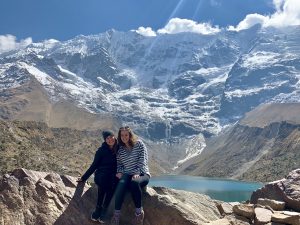
Madison Fritz Works with Preschool, and with People Living with Disabilities in Cusco, Peru (Summer 2019) Blog 1
I spent the majority of my summer vacation living and volunteering in Cusco, Peru with A Broader View Volunteers, a nonprofit, international volunteer organization. During my time in Cusco, nearly two months, I was fortunate to have lived with an incredible, large host family, partner with two local nonprofits, and explore the natural beauty and history of Peru itself. My typical routine consisted of volunteering eight hours a day Monday through Friday and taking part in cultural excursions on the weekends. During the week, I was working in a local preschool, conveniently located near my homestay, in the morning. I was specifically partnered with a four-year-old classroom where I acted as a general teacher’s assistant as well as occasionally assisted in providing basic English language education. Working in a school setting provided me a host of benefits as a future educator, as well as challenged me academically as I was constantly communicating, planning, and instructing in a language different than my own. After a busy morning volunteering at the preschool and eating a delicious, traditional lunch prepared by my wonderful host mom, I would then spend the remainder of the day volunteering at home run by Catholic nuns for adults and children with disabilities. I generally worked in the children’s wing at Madre Teresa Calcuta. The children’s department housed roughly fifteen boys and girls under the age of eighteen who generally had very severe physical and cognitive disabilities – many of the children were nonverbal. Typical daily activities at the home included providing assistance during meal times as well as assisting the therapists and nurses with their daily routines. During my time in Peru, I was able to experience a different culture, receive real world experience working in the nonprofit sector, and actively challenge myself daily. I could not be happier with my summer of service experience and hope to return to Peru in the near future.
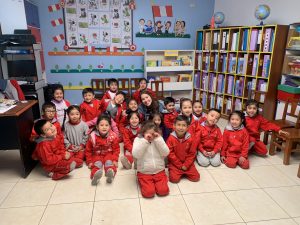
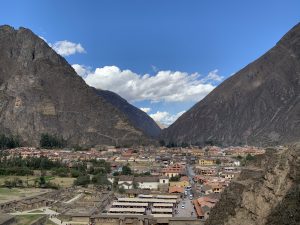
Lauren Oxendine Practices Counseling & Humanitarian Action Internship in Amman, Jordan (June 15-August 3) Blog 2
Five of my weeks abroad was spent interning at Save the Children Jordan’s (SCJ) Department of Advocacy, Media, & Communications which was secured through SIT after a round of applications, cover letters, and interviews. I have really enjoyed my internship experience and it has shed light on a potential career path for me. At SCJ, I learned more about the services provided to impoverished Jordanians and Non-Jordanians living in Jordan as well as child protection services, a field that intrigues me the most. I can see myself coming back to Jordan after graduating from Rollins and really focus of bettering the lives of children, mainly since I want to ensure their safety and happiness.
 This is a picture of me from my desk at Save the Children Jordan. It is taken from my Rollins Instagram takeover video.
This is a picture of me from my desk at Save the Children Jordan. It is taken from my Rollins Instagram takeover video.
My largest assignment was meeting with each program director in our office and reviewing 3-5 case study profiles from each director. This will be used to compile a final list of 10 case studies which will go on to be filmed by a professional as part of a video to celebrate Save the Children’s 100 year anniversary. Each case study focuses on a child beneficiary in Jordan and the success they’ve accomplished since gaining the resources from SCJ. There will be a mix of Jordanian and refugee beneficiaries in the final product released in the Fall.
 This image was taken by myself during a work field trip to the Zarqa Vocational Training Center which was sponsored by SCJ and the German BMZ. The event pictured is the conclusion of a young woman’s two-year training course for hairstyling and makeup application. At this event, employers observe and may hire them.
This image was taken by myself during a work field trip to the Zarqa Vocational Training Center which was sponsored by SCJ and the German BMZ. The event pictured is the conclusion of a young woman’s two-year training course for hairstyling and makeup application. At this event, employers observe and may hire them.
Out of this internship, I’d say the most significant gain I’ve had was strengthening my network through my fellow intern Hala and supervisor Layal as well as gain a perspective of post-college life. This experience has led me to pursue a graduate degree in Human Rights or Forced Migration studies with the goal of working within the UNHCR or other organizations that work directly with the populations they serve.
Lauren Oxendine Practices Counseling & Humanitarian Action Internship in Amman, Jordan (June 15-August 3) Blog 1
With the sponsorship of the SHIP Grant, I was able to attend a study abroad- internship in Amman Jordan this past summer. The program was through the School for International Training (SIT) and it was titled: Counseling & Humanitarian Action Internship in Amman, Jordan. The first two weeks of the program was spent learning about the causes of increased forced migration and asylum seekers in the region, especially the influx in Jordan as it is one of the stablest and safest countries in the region, as well as learning about how Jordan and international players are working to solve some of the problems that increased migration has caused, especially for those with UNHCR Refugee status. This period of classroom learning was joined with guest speakers from the UNHCR, members of Jordanian Parliament, and professors from the nearby universities as well as venturing out to the historically important locations throughout Jordan and to some of the organizations involved with refugees.
 Image of myself (black shirt) and friends from the SIT program while on an excursion to Ajloun, in the north of Jordan. In the picture, we are at the top of Ajloun Castle with the landscape of Syria behind us.
Image of myself (black shirt) and friends from the SIT program while on an excursion to Ajloun, in the north of Jordan. In the picture, we are at the top of Ajloun Castle with the landscape of Syria behind us.
I was most interested in adaptations needed from the UNHCR for the specific type of refugees coming into Jordan and how their top priority was making sure the refugees are safe, healthy, and gaining a childhood education. Additionally, the transformation of the crisis was important: from a refugee crisis to a developmental crisis. The number of refugees entering Jordan has dwindled but the refugees present have stayed in Jordan for the past eight years without having access to employment and having limited access to housing and education. The UNHCR and worked with the Jordanian government in providing a number of employment licenses to Syrian refugees as well as incorporate non-profit school centers to help reach out to children.
 This picture shows myself in front of The Treasury in Petra during a southern excursion of Jordan. The Treasury is a UN World Heritage Site and is still home to some of the original inhabitants.
This picture shows myself in front of The Treasury in Petra during a southern excursion of Jordan. The Treasury is a UN World Heritage Site and is still home to some of the original inhabitants.
Valerie Ponce Attends Summer of Code 2019 in San Francisco, CA (July 14-August 23) Blog 2
A Breakthrough in San Francisco
I failed the test. When I realized that this was actually my own reality all I could truly do was feel anguish. I felt like there wasn’t anything I could do and all the hard work that I did leading up to the test was for no reason. All those hours of practicing problems on JavaScript had done me no good. Luckily, my professor, Sherif, and facilitator, Malena, were right there to catch me right before I convinced myself it was impossible to pass. “The first step is to realize that this is not failure”, this was the first thing that Sherif told me, knowing my ungodly fear of failure would soon begin to devour my mind. When he said this I truly didn’t understand what he meant. I failed the test which was my exact definition of what failure looks like. I thought that I had truly wasted this experience because even though I worked extremely hard and learned an immense amount, it was not enough. Unfortunately at the time, I didn’t know that all of this was untrue. This was the moment before I would have my big breakthrough in San Francisco.

I was given a loaded plan of what I needed to do in the next 5 days leading up to the test that would “for sure” make me pass the test with flying colors. I didn’t believe any of this in the beginning because it didn’t make much sense that five days would make any difference. I thought I needed months to be able to master the concepts that I was being tested on. Despite my skepticality, I knew that I had to at least try to pass so I followed the plan I was given: 100 easy practice problems, redoing the past practice test, and yet again reading hundreds of pages a night. I’m going to be completely candid, I did not do exactly as I was instructed to because I felt like it was a little extreme. That being said, I did what I thought I could which ended up being 50 easy questions on my own, 20 partner work problems, and keeping a coding diary filled with pieces of code that challenged, interested, or intrigued me. I did this for 5 days straight (I definitely took a lot of breaks because that was also heavily recommended by my instructors) and I wasn’t sure if it was going to be enough. I did all I could to simply expose myself to every function, method, piece of code that I could get my hands on. I wrote everything down and when I went to bed every night I would re-read my notes right as I would drift off into a deep slumber. This was a process that I would repeat up to the day of the test and intend to repeat in any moment where I need to intensely study. When the test came, not only did I pass it, but I got the highest score out of all the retakes and this test was exponentially more difficult than the original test.

This experience made me realize that I could accomplish anything that I set my mind to. I passed the test and I was able to show myself that I could do it. But despite passing the test, I got a much more valuable lesson which was the fact that success, in my eyes, is no longer simply “passing the test” or getting the best grade or anything in that aspect. Success to me is learning and expanding my knowledge. I can now say that I have conquered my fear of “failure” and this wouldn’t have happened without going to this program and challenging myself through rigor and confusion.

Valerie Ponce Attends Summer of Code 2019 in San Francisco, CA (July 14-August 23) Blog 1
What I learned from Adjacent Academies
To say that Adjacent Academies has an unconventional methodology of educating students would be an understatement. Never have I encountered a challenge where I truly felt like I was headed towards failure and there was absolutely nothing I could do. Throughout all my years in school there was always some light at the end of the tunnel where I felt like everything would resolve itself. This experience was very different. Despite all of this, I would definitely repeat the experience as many times as I could. There are so many different things that I could say about this program but I’m going to do my best to give an overall explanation of how I grew and what I learned.

The basic premise of this program (or what I perceived) was that we would learn coding and web development in the time frame of six weeks in San Francisco, California, the technological powerhouse of America, otherwise known as Silicon Valley. This was an opportunity of a lifetime where I would be able to focus solely on coding, develop a problem solver’s mind, and possibly even learn how to make a website. This was all true, but the Adjacent Academies: Summer of Code 2019 went so much further than my expectations. The six weeks would comprise of group projects, survey thousands of pages, creating websites with HTML and CSS, learning JavaScript, experimenting with Node Frameworks, networking, and so much more. The amount of knowledge that I was able to gain in such a short six weeks was something that was unimaginable before I went to San Francisco.

The most essential concept that I learned which would truly impact everything I would do moving forward was: learning how to learn. Though this may seem trivial because it is assumed that “everyone knows how to learn” because it is human nature, knowing HOW to truly learn is completely different from the surface level learning that many settle for. I now know how to the key to educating oneself is to delve into what interests us the most. Though this may not be easy in a conventional education system, this will allow me to expand my knowledge on my own terms. Instead of waiting for the professor to tell me what we are learning next I now know that I am capable of learning so much more than what’s on the syllabus. Exposure was another concept that was emphasized when we were learning how to learn as we were told that the best way to expand our minds is to survey at least 100 pages of a book in a night. Though this may seem a bit ridiculous when you think about it too much it’s only about an hour of your time and it’s not too complicated to do. Understanding that being confused is simply a part of the learning process and embracing the discomfort that one feels when they don’t know something is a crucial part of learning. Once I was able to overcome this mindset of fearing the unknown, I was able to learn much more at a faster rate. These were the 3 key points that were indicative of the “learning how to learn” philosophy.

Now that I know how to learn, I am able to bring this into everything that I do. I feel like I am truly capable of so much more than I thought. The amount of confidence that I have gained from learning this basic concept is incredible. I remember my professor distinctly telling me that his goal was to teach us how to teach ourselves so that we could always be knowledgeable about anything we wanted. Never in my wildest dreams would I have thought that I would be able to make and present 6 different fully fledged projects that I completed in less than 24 hours, have informational interviews with professionals at Facebook, network with people at huge companies like Amazon and Handshake, and live in San Francisco, all in six weeks. This was all possible because my professor believed in me and told me that one day I wouldn’t need another person’s validation to feel accomplished. Without the help of these amazing people I wouldn’t have been able to This program did an amazing job at focusing on both hard and soft skills which was extremely important because I feel like I am prepared for the real world.
Ultimately, I would say that the skills that I have gained from this experience has made me realize what I am capable of. My confidence has skyrocketed and I am extremely grateful that I was able to experience this opportunity. I took this program by the horns and I pushed myself to embrace the confusion. I made amazing connections with people and learned so much about the world of technology. I know that this is definitely something that I want to do with my life and hope to only go on more adventures like this one.
Dominique Douglas Attends the 2019 British Women Writers Conference at Auburn University in AL (April 25-27) Blogs 1 & 2 Combined
My palms are sweating, and my stomach feels like it’s about to implode upon itself. I quietly slip outside to pace back and forth and take long deep gasps of air. I had my very first anxiety attack. I had arrived at this conference in Alabama, ready to sit amongst my peers, and have a meaningful discourse about literature that captivated me in previous semesters. While sitting in on panels from other 18th-century British women writers, I had begun to second guess the quality of introspection my paper showed. Compared to the incredible talent I had just witnessed; I wasn’t sure I was ready for this level of academic discourse. Fortunately, my previous professor had arrived after the first day, and we had an impactful heart to heart. Sitting on the step outside the front of The Hotel at Auburn University, he said, “Dom, some of these people have Ph.D.’s, and some of them are college sophomores.” He assured me everyone comes here with ideas. The aim is to collectively engage in discourse that will help each of us; think more profound, or think more significant, or spark the ideas that haven’t come yet. He admitted that although he seems in his element in the classroom, reading his personal works in front of his peers sometimes gives him butterflies; even this far into his professional career. I realized there is a healthy amount of fear necessary in any personal growth, and I found comfort in that.

My panel consisted of, a high school principal going back for her Ph.D. and a doctoral graduate student from another University who presented part of her dissertation. We all discussed different aspects of Emily Brontë’s novel, Wuthering Heights. Although I have read that novel what feels like a million times over, I was still equally engaged in each of the varying perspectives of the other panelists. I was still learning new ways to read and interpret this piece of literature. When it came time for me to read my paper, I noticed a pit developing in my stomach. As I looked at the audience, and over to the other panelists, I remember previous conversations with many of them. Some of them I spoke with at previous sessions, and others at the dinner the night before. Everyone at my table had a unique story that brought them here, not like mine but equally as impactful. That background formed the person they are and the perspective that I just got the privilege of understanding. I understood that my view may be a valuable addition to some discourse, and at worst, I’d get some feedback to take with me and learn from. After the Q&A session, where my professor sat tall in the back row, smiling from ear to ear as I answered the questions from my peers in the audience, I also smiled at my newest accomplishment. I was terrified at one point, but I prepared as well as I could, and I will take what I learned and do that much better next time. Because surviving my first conference has only given me the courage to try again next year. The experience has been one of great reflection and growth both academically and personally. I can’t emphasize enough that I wouldn’t have been able to pull the funds together to attend if not for the generous SHIP grant, I received from Rollins College.

Ryo Hasegawa Attends the International Conducting Workshop & Festival 2019 in Sofia, Bulgaria (August 6-16) Blogs 1 & 2 Combined
What ICWF 2019 Brings to My Conducting
September 10, 2019
“You’ll upgrade their ear concentration by looking like this is critical for the world.” (Larry Rachleff)
The questions like what conductors do or why they need to be there do not have a single clear answer. Every person’s experience in conducting is different, and they have their idea of what we do as a conductor; hence the technique they teach varies from each other. However, it is possible to find out a minimum contribution of conductors to music by thinking back to the beginning; what music is.
This workshop structured in a way that all the conductors can learn a lot from watching other conductors conducting and being coached. You will conduct 10 minutes with either sextet (five string players and a piano who covers all the wind and the brass) or full orchestra. While you conduct, two teachers collaborate for their coaching: they would stop, explain what was good and needs to be fixed, and demonstrate how to do it occasionally. Since there were more than 30 other conductors, the majority of the time were observation time.
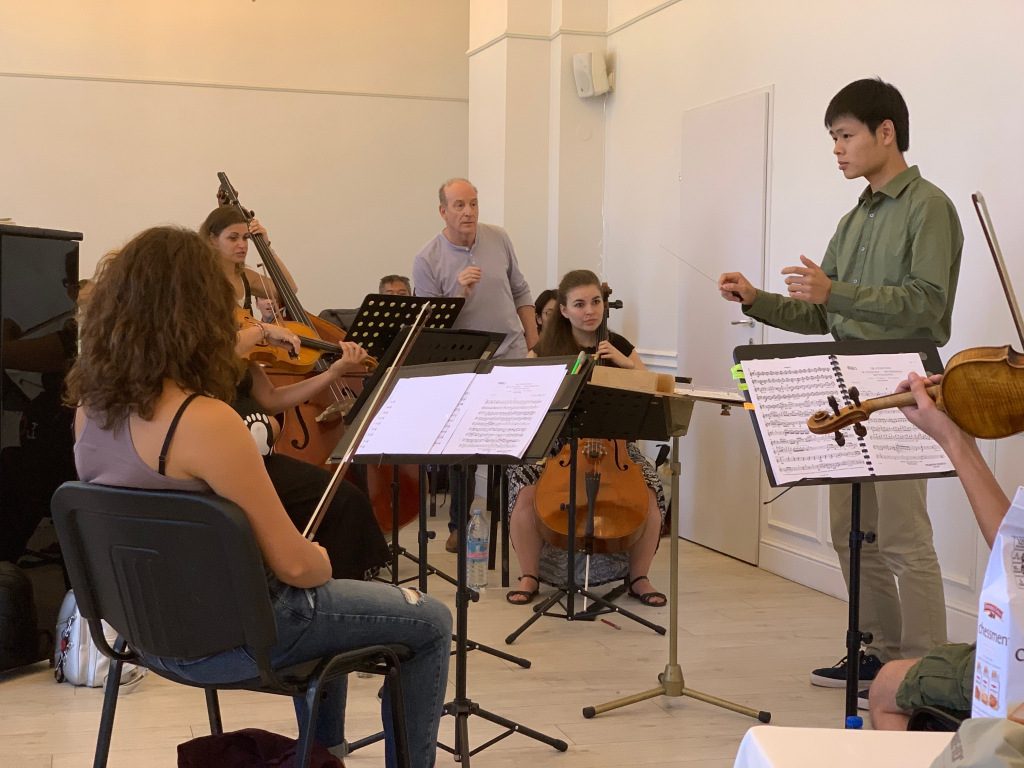 Conducting a sextet session while being coached by Larry Rachleff
Conducting a sextet session while being coached by Larry Rachleff
I was nervous and quite uncomfortable when I went up to conduct in front of two teachers who kept stopping to give me many critiques and other 34 conducting colleague and 60-80 musicians who witnessed it. Interestingly, I was able to learn more when I was off the podium and listening and observing what two maestri were working on with other conductors.
As I kept taking my note of what two masters say and how the orchestra reacts to all other conductors, I realized the most basic, but the most crucial fact of music; music is audible arts. The ideal performance moment is when all the players are listening to each other, and everything will match, such as intonation, articulation, rhythm, character, and ensemble. When Donald Schleicher said “Just standstill. It’s no fun to not move, but boy is it effective” I could not figure out what it means. However, when I did as he told, suddenly the music became together and beautiful.
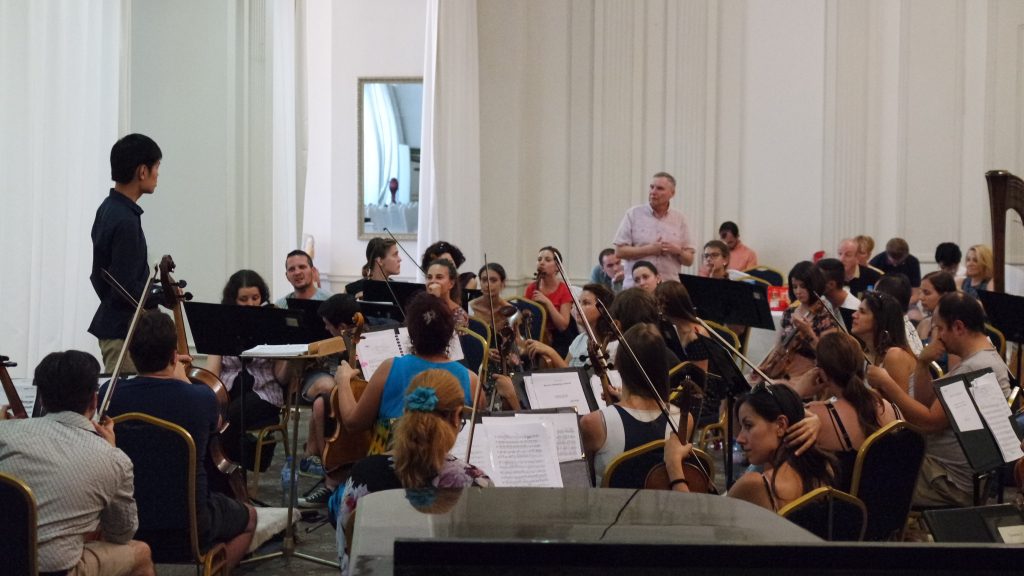 Being coached by Donald Schleicher “Standstill”
Being coached by Donald Schleicher “Standstill”
This realization made me reconsider about the ideal leadership figure. Rather than commanding, giving the orders, or making something happen by giving a big gesture to interrupt playing, it is more important and efficient for leaders to have a presence where people feel comfortable to collaborate for the organization’s goal. As conductors can be the most powerful when they create their “being” by conveying authenticity and venerability to music, true leaders might be the one who can be what other people need to be for the teamwork.
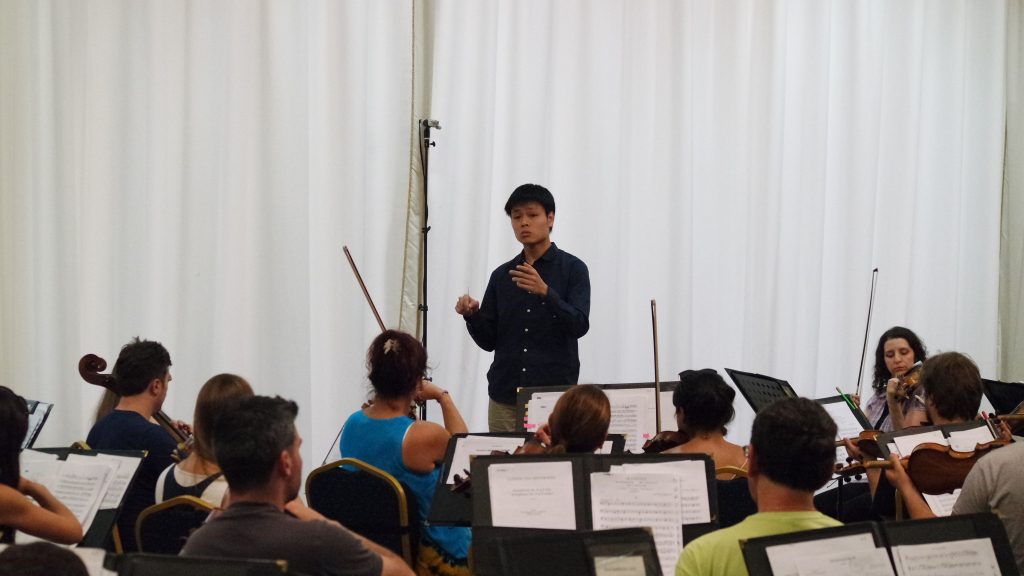 Conducting a full orchestra session with New Symphony Orchestra
Conducting a full orchestra session with New Symphony Orchestra
